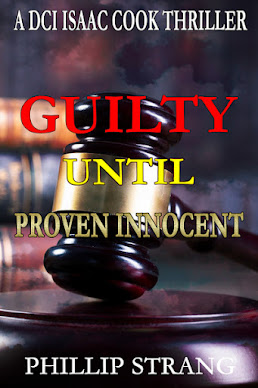This book makes me very sad and frustrated.
I've loved the DCI Isaac Cook novels, the characters and the stories. Their cases are complex, and the endings aren't always entirely happy. Isaac Cook is aware of the darker strains in British policing and British politics, and he keeps striving, along with his team, to solve crimes and uphold justice. I've never been quite as enthusiastic about his mentor, Chief Superintendent Goddard, but they are both far better men than their rivals, Commissioner Davies, and Superintendent Seth Caddick.
Two years ago, the Challis Street homicide team investigated the murder of a woman in her own bed, stabbed with a knife found to have the fingerprints of a man name Gary Harders. Drinker, addict, small-time criminal; he was probably in the house to steal money for a drug fix. But why did he go to the bedroom? And why did he stab the sleeping Helen Mortimer, when he could have just backed out quietly?
It doesn't really make sense, but his fingerprints are on the weapon, he confesses, and all of the other plausible suspects--her husband, his lovers--have solid alibis. He gets a 25 year sentence, and goes quietly off to prison.
Two years later, two new technicians in the forensic unit are given that knife to test their skills on, and find a new set of prints. The immediate conclusion is that Homicide charged the wrong person, screwed up the case, by missing that other set of prints. It's a matter of weeks before Harders is released, and without new evidence, there's no chance of sending Harders back to prison.
Of course, none of this makes sense. It was Forensics, not Homicide, that didn't find--or didn't report--the other set of prints. Harders confessed. And it obviously wasn't Homicide that prosecuted him. But, the Homicide team at Challis Street Station is taking the blame. That has been set up to take the blame. There's an internal inquiry, and of course Commissioner Davies and Superintended Caddick are playing major roles.
They're also playing roles in something else, something far bigger, and far darker than just setting up scheme to ruin your rivals' reputations. Davies is a major figure, and comes forward as the public face, of a plot to "stop the decay of London and our civilization." It rests on the dearly held idea that London, and the UK generally is in serious, dangerous, potentially irreversible decay. Crime is out of control! It must be stopped.
Isaac Cook, and to a lesser extent, Goddard, when they are separately approached by Caddick and Davies, don't like the idea that democracy won't survive the draconian crackdown Davies is preparing to implement, but neither of the questions the basic premise that crime is rising and social norms are disappearing, and Something Drastic Must Be Done. They just wonder if this is what needs to be done, and whether the cost will be worth it. Goddard is less worried about that last bit than Cook is.
And, I thought, is the UK really that much worse than the US in this? Because, violent crime and other scary street crime is decline. Even counting the mass shootings, which are anything but in decline here. I went to take a look at crime statistics in the UK
Violent and dangers crime is declining there more than it's declining here--possibly due the the lack of an epidemic of mass shootings.
The basic premise is false, and no one in the book questions the basic premise. Nor does the narrative voice, to the extent that that's separate from Cook's viewpoint.
Strang is a good writer.
But I don't want to read the next book, in which the UK presumably goes full fascist. And yes, they do literally discuss in the book that what's being pushed would create a fascist government, disguised by the decorative continuation of the Parliament and the monarchy.
(And no, he doesn't live in the UK himself. He's lived in Australia for decades.)
I received an electronic galley of this book.

No comments:
Post a Comment